
Annual Review of Plant Biology
Scope & Guideline
Exploring the Frontiers of Plant Science
Introduction
Aims and Scopes
- Plant Development and Morphogenesis:
The journal frequently covers the genetic, molecular, and physiological bases of plant development, including studies on stem cells, differentiation, and reproductive structures. - Plant Responses to Environmental Stress:
Research focusing on how plants adapt to abiotic stressors such as climate change, drought, and salinity is a core area, highlighting physiological and biochemical responses. - Plant-Microbe Interactions:
The journal includes articles on symbiotic relationships, such as mycorrhizal and endophytic interactions, and their implications for plant health and ecology. - Plant Metabolism and Biochemistry:
A significant focus is placed on plant metabolic pathways, including specialized metabolites and their roles in plant defense and adaptation. - Epigenetics and Gene Regulation:
The exploration of epigenetic mechanisms and gene regulatory networks in plants is a recurring theme, reflecting the journal's commitment to understanding plant complexity. - Synthetic Biology and Biotechnology:
The journal addresses innovative applications of synthetic biology in plants, including genome editing and metabolic engineering to enhance traits.
Trending and Emerging
- Climate Change Adaptation Mechanisms:
Recent papers increasingly focus on how plants adjust to climate change, including physiological and genetic adaptations, highlighting the urgency of understanding these mechanisms for future sustainability. - Integrative Omics Approaches:
There is a growing trend towards the use of multi-omics (genomics, transcriptomics, proteomics, and metabolomics) to provide comprehensive insights into plant biology, reflecting a shift towards data-driven research. - Synthetic Biology Applications:
The application of synthetic biology techniques in understanding plant functions and improving traits is gaining traction, showcasing innovative approaches to tackle agricultural challenges. - Plant Signaling Pathways and Networks:
Emerging research on complex signaling networks, particularly those involving hormonal and environmental cues, underscores the intricate regulatory mechanisms plants employ. - Microbiome Influences on Plant Health:
An increasing number of studies are exploring the role of the plant microbiome in health and disease, illustrating the importance of microbial interactions in plant biology.
Declining or Waning
- Traditional Breeding Techniques:
While still important, there is a noticeable decrease in publications focusing solely on traditional breeding methods, as researchers increasingly turn to genetic engineering and molecular approaches. - Basic Plant Morphology Studies:
Research centered on fundamental morphological studies has waned, potentially overshadowed by more complex investigations into molecular and genetic mechanisms. - Static Observations of Plant Physiology:
Studies that do not integrate dynamic, real-time analyses or modern technologies (such as imaging and modeling) are becoming less common, reflecting a trend towards more comprehensive, integrative research. - Nutrient Acquisition in Isolated Conditions:
Investigations of nutrient acquisition under isolated lab conditions are declining, as there is a greater emphasis on understanding these processes within ecological and agricultural contexts.
Similar Journals

RUSSIAN JOURNAL OF PLANT PHYSIOLOGY
Advancing Plant Science Through Rigorous ResearchRUSSIAN JOURNAL OF PLANT PHYSIOLOGY, an esteemed publication with ISSN 1021-4437 and E-ISSN 1608-3407, is dedicated to advancing knowledge in the field of plant science. Published by PLEIADES PUBLISHING INC in the United States, this journal serves as a critical platform for researchers, professionals, and students aiming to explore the intricacies of plant physiology, biochemistry, and environmental interactions. With a consistent output from 1996 to 2024, the journal holds a commendable position within the academic community, reflected in its Q3 ranking among 516 journals in the Plant Science category (2023) and a competitive 44th percentile ranking in the Scopus database. Although the journal is not Open Access, it continues to attract a diverse readership of scholars eager to publish groundbreaking research. It stands out as a vital resource for anyone engaged in understanding the physiological processes that underpin plant life, thereby contributing to global agricultural advancements and ecological sustainability.

JOURNAL OF PLANT RESEARCH
Pioneering Discoveries in Plant Science.JOURNAL OF PLANT RESEARCH, published by SPRINGER JAPAN KK, is a leading academic journal that has carved a niche in the field of Plant Science. With its ISSN 0918-9440 and E-ISSN 1618-0860, this journal has been disseminating high-quality research since its inception in 1993 and continues to be essential reading for academics and practitioners alike, aiming to bridge the gap between innovative plant research and practical applications. The journal is highly regarded, holding a prestigious Q1 ranking in Plant Science for 2023, and is positioned in the top 80th percentile within the Scopus rankings for Agricultural and Biological Sciences. The journal's coverage includes a wealth of topics pertinent to advancing our understanding of plant biology, ecology, and sustainable agricultural practices. Although it operates under a subscription model, its influence in the research community remains profound, making it a vital resource for contemporary studies in plant-related disciplines.

PHYSIOLOGY AND MOLECULAR BIOLOGY OF PLANTS
Fostering a Deeper Understanding of Plant MechanismsPHYSIOLOGY AND MOLECULAR BIOLOGY OF PLANTS, published by SPRINGER, is a vital journal focused on the advancing field of plant science. Featuring research that spans physiology, molecular biology, and their applications in agriculture, this journal is pivotal for academics, professionals, and students keen on understanding plant processes and enhancing crop production. With an ISSN of 0971-5894 and an E-ISSN of 0974-0430, this journal is recognized for its scholarly significance, ranking in the Q3 category in Molecular Biology, Q2 in Physiology, and Q1 in Plant Science as of 2023. The journal maintains a strong position in the Scopus rankings, with notable percentile rankings including 87th in Plant Science. Established in 2000, this publication aims to foster the dissemination of cutting-edge research by providing a platform for open discussion and knowledge sharing about plant physiology and molecular mechanisms. While it does not currently offer open access options, its comprehensive studies and reviews serve as an essential resource for enhancing our understanding of plant biology.
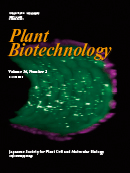
Plant Biotechnology
Cultivating Insights for a Greener Future.Plant Biotechnology is a distinguished journal published by the Japanese Society for Plant Cell and Molecular Biology, committed to advancing the field of plant biotechnology through the dissemination of high-quality research. With an ISSN of 1342-4580, this journal caters to a global audience interested in agronomy, crop science, and plant molecular biology. The journal has achieved notable rankings, including Q2 in Agronomy and Crop Science and Q2 in Plant Science, underscoring its relevance and impact in these fields according to the latest 2023 metrics. Furthermore, it holds a respectable position within Scopus rankings across multiple categories, indicating its contribution to the academic community. Although it is not an open-access journal, its regular publications, spanning from 1997 to 2024, feature cutting-edge studies that explore innovative approaches and technologies in plant science. Researchers, professionals, and students will find Plant Biotechnology an essential resource for staying informed on significant advancements and trends in plant research.

NEW PHYTOLOGIST
Advancing Knowledge in Plant PhysiologyNEW PHYTOLOGIST is a premier international journal published by WILEY, focusing on the field of plant science and physiology. Operating since 1902, this esteemed journal has established itself as a vital resource for researchers and professionals alike, offering cutting-edge research and insights into the complex workings of plants and their physiological processes. With an impressive impact factor and recognized in the top quartile (Q1) of both the physiology and plant science categories, it ranks #8 and #9 respectively in their fields, placing it within the top 2% of journals. NEW PHYTOLOGIST is not only essential for enhancing the understanding of plant biology but also for addressing global challenges such as food security and environmental sustainability. Although it does not currently offer open access, the journal remains committed to disseminating knowledge to a wide audience through institutional subscriptions and partnerships. This journal continues to drive advancements in plant science into the future, making it an invaluable asset for students, researchers, and industry professionals.

PLANTA
Discover the genetics of nature’s green wonders.PLANTA, published by SPRINGER, stands as a pivotal journal in the field of plant sciences and genetics, known for its rigorous peer-reviewed research that has influenced the advancement of botanical science since its inception in 1925. With an impressive trajectory of convergence from the years 1925 to 1945, and again from 1947 to 2024, this journal maintains a strong reputation, currently categorized in the prestigious Q1 tier of Plant Science and Q2 tier in Genetics as of 2023. The journal is recognized for its high impact, ranked #64 out of 516 in Plant Science by Scopus, representing the top 87th percentile within its category, while also securing a strong position in Genetics with a #92 rank. The journal serves as a critical resource for researchers, professionals, and students who are eager to explore the complex genetics, biochemistry, and evolutionary biology of plants. Though primarily subscription-based, the quality of the research published in PLANTA makes it an essential reading for anyone serious about advancing their knowledge and understanding of plant sciences.
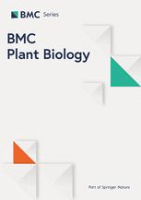
BMC PLANT BIOLOGY
Cultivating Insights in Plant ScienceBMC Plant Biology, published by BMC, is a leading open-access journal devoted to the field of plant science, presenting high-quality research that contributes significantly to the understanding of plant biology. Since its inception in 2001, the journal has established itself as a prominent platform for disseminating innovative research, achieving a commendable Q1 ranking in Plant Science within the 2023 Scopus quartiles, and ranking #39 out of 516 journals in the Agricultural and Biological Sciences category, indicating its substantial impact with a 92nd percentile ranking. Researchers, professionals, and students engaged in the study of plant biology will find a wealth of knowledge in its comprehensive scope, covering critical areas such as molecular biology, genetics, ecology, and biotechnology. The journal's commitment to open access ensures that cutting-edge research is available to a global audience, fostering collaboration and advancement in the field. BMC Plant Biology continues to inspire and facilitate growth in plant-related studies, making it an invaluable resource for anyone interested in the vibrant and essential domain of plant science.
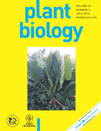
PLANT BIOLOGY
Innovating Research for a Greener TomorrowPLANT BIOLOGY is a prestigious academic journal published by Wiley, dedicated to advancing knowledge in the fields of plant science, ecology, and evolutionary biology. With an impressive impact factor and ranking in the Q1 category for Ecology, Evolution, Behavior and Systematics, and Plant Science as of 2023, it stands at the forefront of research dissemination. The journal encompasses a broad scope of plant biology topics, providing a critical platform for researchers to share innovative findings and foster interdisciplinary collaboration. Available in both print (ISSN: 1435-8603) and online formats (E-ISSN: 1438-8677), it ensures accessibility through open access options. As a crucial resource for professionals, researchers, and students alike, PLANT BIOLOGY cultivates a deeper understanding of plant systems and their ecological significance, making it an essential addition to the library of anyone dedicated to the study of biology and the environment.
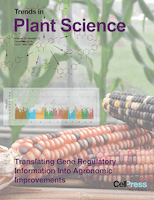
TRENDS IN PLANT SCIENCE
Unlocking New Perspectives in Plant ResearchTRENDS IN PLANT SCIENCE is a premier academic journal published by CELL PRESS, dedicated to advancing the field of plant sciences. With an ISSN of 1360-1385 and E-ISSN 1878-4372, this journal has established itself as a critical resource for researchers and practitioners alike, boasting a remarkable impact factor that places it in the Q1 quartile for plant science in the 2023 rankings. Featuring a comprehensive scope that encompasses emerging trends, innovative research, and pivotal reviews in the plant sciences, it aims to promote interdisciplinary dialogue and encourage progressive research methodologies. Hailing from the United Kingdom, TRENDS IN PLANT SCIENCE serves a global community of over 516 journals, achieving a top-tier ranking of 3rd in the Scopus ranking for Agricultural and Biological Sciences. This makes the journal an indispensable asset for anyone aiming to keep abreast of the latest developments in plant biology and its applications. As we look towards its future converging years from 1996 to 2024, the journal continues to foster scholarly excellence and innovation in the field.
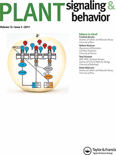
Plant Signaling & Behavior
Unlocking the Secrets of Plant CommunicationPlant Signaling & Behavior is a prestigious journal published by TAYLOR & FRANCIS INC, dedicated to advancing the understanding of the complex signaling mechanisms and behavioral responses of plants. With an ISSN of 1559-2316 and an E-ISSN of 1559-2324, it has firmly established itself in the field of Plant Science, earning a Q1 ranking in the 2023 category quartiles and ranking #83 out of 516 in Agricultural and Biological Sciences, placing it in the 84th percentile according to Scopus metrics. The journal serves as a vital platform for researchers and professionals looking to publish innovative studies and reviews that explore the intricate relationships between plant behavior and environmental signaling. With coverage spanning from 2006 to 2024, Plant Signaling & Behavior not only enhances academic discourse but also supports the growing interdisciplinary nature of plant sciences. Although the journal is not open access, it remains a significant resource for students, researchers, and practitioners aiming to deepen their understanding of plant signaling and its implications for ecology and agricultural practices.